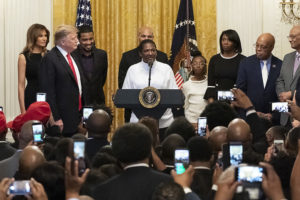
President Donald J. Trump and First Lady Melania Trump look on as Catherine Toney delivers remarks at the African American History Month Reception Thursday, Feb. 21, 2019, in the East Room of the White House. Toney was one of the first women released under the First Step Act. (Official White House Photo by Andrea Hanks)
It was a busy week for the media as it tried to boost the reputations of both Baltimore and Al Sharpton by trying to prove that Trump is a racist. A more important question would have been, as Donald Trump tweeted, does America need a reality check?
Racist or Not?
There are far more productive questions to debate than figuring out whether Trump is a racist, writes Jason L. Riley in the WSJ.
- Why haven’t black-run cities like Baltimore produced more black economic advancement?
- Why do black politicians like Maryland Rep. Elijah Cummings, who was re-elected to a 13th term with more than 76% of the vote in 2018, so routinely skirt responsibility for the living conditions in their districts?
- Is there any significant connection between black political power and black prosperity?
(W)hen dealing with political opponents who are obsessed with racism, real or imagined, indifference to whether you are labeled a racist might even be an asset. The reality is that much of the racism that the left complains about these days has proved under scrutiny to be imaginary, which is good news for the country but bad news for politicians and activists who thrive on racial division.
The last time the rest of America thought about Baltimore was probably 2015, when Baltimore’s residents rioted after Freddie Gray, a black suspect, died in police custody. When Ferguson, Mo. residents rioted a year earlier after another black suspect was shot dead while assaulting a police officer, the media and activists highlighted the fact that Ferguson’s city leaders and police department were mostly white. According to Mr. Riley, a U.S. Justice Department review of the incident said that it was “critically important for law enforcement agencies, and the Ferguson Police Department in particular, to strive for broad diversity among officers and civilian staff.”
In 2016 Harvard economist Roland Fryer published an empirical study that examined more than 1,000 police shootings in 10 major departments nationwide. He concluded that there was no evidence of racial bias in police shootings and that blacks are about 24% less likely “to be shot at by police relative to whites.”
Don’t Let Facts Get in the Way
So far, such research has failed to persuade Colin Kaepernick, Black Lives Matter activists and Democratic presidential candidates. And the political press prioritizes anecdotal evidence and viral videos on social media, not hard data. Still, it’s worth noting that a new academic study published last week is broader in scope than Mr. Fryer’s and backs his findings.
Many on the political left and in the media are loath to discuss how large black-white differences in violent crime rates result in racially disparate encounters with police. But why should anyone be surprised that young black men are far more likely than their white peers to be shot by police when young black men commit homicides at nearly 10 times the rate of white and Hispanic young men combined? “One of our clearest results is that violent crime rates strongly predict the race of the person fatally shot,” write the authors. Moreover, “reducing race-specific violent crime should be an effective way to reduce fatal shootings of Black and Hispanic adults.”
More minority cops might help law enforcement build trust in certain communities, but the “data suggest that increasing racial diversity would not meaningfully reduce racial disparity in fatal shootings.” Minority officers are no less likely to draw their weapons on minority suspects.
Don’t hold your breath that liberals will address racial disparities. Al Sharpton visited the Obama White Houses frequently and “given the way the people on stage Tuesday and Wednesday night have lined up to kiss his ring, chances are that the reverend will be monetizing racial strife for years to come.”
We may be in a racial holding pattern until the 2020 election. Mr. Trump won’t back down, and his opponents, if they’re being honest with themselves, don’t really want him to.
Read more here.
If you’re willing to fight for Main Street America, click here to sign up for the Richardcyoung.com free weekly email.




